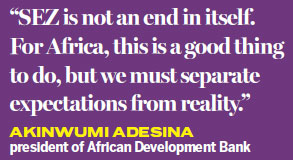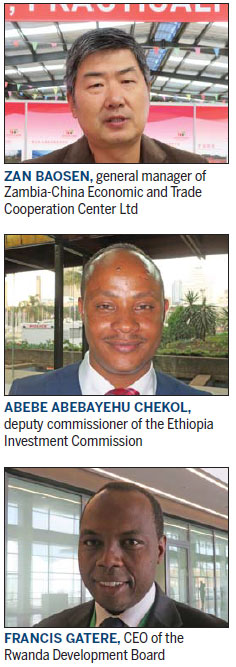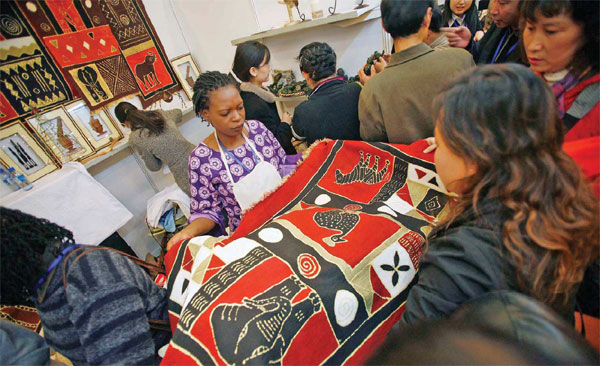Not business as usual
Updated: 2016-09-16 07:09
By Lucie Morangi(China Daily Europe)
|
|||||||||
Special economic zones can work in Africa, but they need the right policies and support to grow
African governments have recently entered into partnership deals with Chinese firms for the construction and promotion of special economic zones in the belief that the firms can import the success that China has had over the past three decades.
But Zan Baosen, the general manager of Zambia-China Economic and Trade Cooperation Center Ltd, says the relationship is a two-way street.

|
Textile products made in Africa on show at an exhibition in Beijing. CFP / For China Daily |
"This model is a strong drive to promote socioeconomic transformation that has been successfully proven in China," he says. "But it can work only if governments provide strong strategic leadership and management."
SEZs are demarcated areas with customized business and trade laws that differ from the rest of the country. They are established to boost trade, investments, create jobs and widely influence investment policies in the country.
According to a survey by China Development Bank, SEZs contribute 22 percent of China's GDP, 45 percent of total national foreign direct investment and 60 percent of exports. SEZs are estimated to have created over 30 million jobs, increased the income of participating farmers by 30 percent, and accelerated industrialization, agricultural modernization and urbanization.
But zones established in Liberia, Senegal and Mauritius in the early 1970s have had mixed results, especially in increasing exports and in creation of jobs anticipated for millions of their people living in poverty.
In a 2011 World Bank study by Thomas Farole in 10 countries, among them Ghana, South Africa, Lesotho, Nigeria, Senegal and Tanzania, he concludes that most African programs compare poorly to their Asian and Latin American counterparts.

"With the possible exception of Ghana, African zones show low levels of investment and exports and their job creation impacts have been limited. African zones are surprisingly capital-intensive," the report says.
The study found little evidence of African programs upgrading, catalyzing wider market reforms and integration between the zones and their domestic economies, or meeting socioeconomic objectives such as delivering quality employment and a living wage.
"Moreover, in many countries, land acquisition, compensation and resettlement practices are inadequate," says the report.
On foreign direct investments, a major source of external finance, inflows to Africa fell by 31 percent in 2015 to an estimated $38 billion, according to a recent United Nations Conference on Trade and Development study. This is largely due to the end of the commodity "super cycle". It comes as global FDI jumped by 38 percent to $1.76 trillion, the highest level since the 2008 economic crunch, the UN agency says.
China's success in SEZs stems from its ability to attract FDI, and adapt policies to changing market conditions while encouraging innovation. China Development Bank says that the country was able to implement a bottom-up problem solving approach backed by top-down government support. These strategies piggybacked on good infrastructure and a large pool of educated and competent workers.
Africa could do well to learn from the Chinese experience, says Zhang Huarong, vice-chairman of the China-Africa Business Council, noting that despite recent efforts by African governments to prop up their hard infrastructure, similar efforts are needed in building their soft infrastructure. Long-term strategies and short-term policies, he says, make a powerful combination for successful industrial parks.
"For Africa to get its own Made in Africa brand, stakeholders, which include governments, investors and civil society, need to have vision, patience and commitment to unlock the continent's potential. Indeed, Africa needs time, capacity development and, most of all, resilience to endure the harsh global trade landscape," says Zhang, who is also chairman of Huajian Group, which has made a substantial investment in a shoe factory in Ethiopia.
But whereas governments have provided a conducive investment environment for foreign firms, they have been criticized for neglecting domestic enterprises, thus failing to diversify the local base. This was especially seen in the export processing zones that were fashioned under the US African Growth and Opportunity Act to allow sub-Saharan countries to export about 6,000 products ranging from live animals, meat, milk and milk products, eggs, nuts and fruit to textile goods at preferential terms to the United States. Most zones have invested in textiles.
The act, which came into effect in May 2000, has seen sub-Saharan countries export less that 2 percent - only about $1 billion - of what's allowed by the act. In Kenya, textile firms import close to 90 percent of the 180,000 bales of raw materials or semifinished fabric used in making garments for the market.

"Industrial progress comes from partnerships between foreign and local players. Foreign investors have to acknowledge that the continent needs to build its skill capacity, and infrastructure and is in need of capital. Partnerships will also ease fledgling industries into global value chains," Zhang says.
His sentiments are backed by a United Nations Industrial Development Organization study that found that indigenous enterprises create more jobs than foreign-owned enterprises.
With the sluggishness in the commodities market, recent cooperation between China and Africa is breathing new life into the continent's SEZs. Ethiopia and Rwanda are emerging as first movers.
Abebe Abebayehu Chekol, deputy commissioner of the Ethiopia Investment Commission, attributes the success to his government's commitment in implementing a five-year-strategic plan that focuses on promoting a booming manufacturing sector.
"We have prioritized our national budget toward financing infrastructure expansion to reduce the cost of doing business," he says. "This is by building rail infrastructure to the Mombasa port and Djibouti while expanding our energy sources by developing the biggest hydroelectric dam in Africa."
Investment policies and implementation are spearheaded by the Ethiopian Investment Board, which is chaired by the prime minister, Hailemariam Desalegn. Helen Hai, a UNIDO goodwill ambassador and vice-president and CEO of Huajian Company's overseas operation, says that it took only three months to decide on setting up a shoe factory in Ethiopia.
"The first thing I want to share with you is that we did not pick Ethiopia - Ethiopia picked us," she said last year during a think-tank forum held in parallel with the Forum on China-Africa Cooperation in Johannesburg.
In 2011, Meles Zenawi, the late Ethiopian prime minister, visited China to promote the country as an investment destination.
Consequently, Huajian shoe factory opened in 2012 and recruited 2,000 workers, doubling that number by the second year. The investment is forecast to reach $2 billion over the next decade, and the firm is already considering setting up its own industrial zone on the southwestern outskirts of Addis Ababa. Its focus is on light manufacturing that will employ around 100,000 locals.
A strong advocate for Africa's industrialization, Hai thinks that to capture the opportunities presented by the relocation of light industries from China, the world needs to hear Africa's success stories. She therefore founded the Made in Africa Initiative and also serves as an adviser to the governments of Ethiopia, Rwanda and Senegal. She joined with Ethiopia to promote a state-owned industrial park that had not attracted a single manufacturer in five years. "But after noting Huajian's success, more than 15 leading international manufacturers settled in Bole Lemi, Ethiopia's first industrial park. Success brings success," says Hai.
Rwanda has noted this success and is eager to replicate it. The landlocked country invited Hai to set up a garment factory in Kigali.
The factory, which is just over a year old, has 500 workers and is exporting products valued at more than $1 million to Europe and the US. There is a total waiver of corporate income tax for companies planning to relocate their headquarters to Rwanda, and a 15 percent preferential corporate income tax for strategic sectors, including energy, transport, affordable housing, ICT and financial services. There also is accelerated depreciation of 50 percent of the tax for key priority sectors, including tourism, construction, manufacturing and agroprocessing, and an exemption of capital gains tax and repatriation tax holiday for capital and assets from the government to support its sustainability.
Francis Gatere, CEO of the Rwanda Development Board, says concerted efforts by the government and sustained investments from the private sector are behind the conducive business environment in the country. "We do not believe in miracles," he says.
The country has recorded sustained economic growth between 7 and 8 percent over the past decade. "Private capital has been growing at 15 to 20 percent of GDP, reaching $1.3 billion in 2015 from $1.2 billion in the previous year. We have a vision and a long-term plan, and we are seriously implementing it," he says.
Gatere says the government is playing a key role in funding infrastructure expansion while creating awareness to encourage locals to take ownership in the development. He says raising the level of domestic investments invariably boosts the country's attractiveness to investors. The country has made it easy for local firms to access credit to capitalize their businesses.
He notes that besides making it easy for businesses to set up in the country - it takes five hours to apply online and get a business license - the laws give legal guarantees to foreign investments. The country has ranked highly lately in World Bank surveys on ease of doing business, compared with other African countries.
Gatere notes that Chinese investments play a crucial role in Rwanda's development since they come with financial backup from government-owned credit institutions. "They therefore jump-start projects using affordable loans and this plays a catalytic role to their success here."
China Star Construction Co Ltd, a construction firm, has finished the first phase of the Kigali industrial zone. The government plans to embark on the second one with hopes of attracting more investors.
"We want to replicate Chinese success in SEZs by acquiring business management knowledge and technology. We know they will be seeking local partners and therefore we support trips by our private players to visit China and build linkages with them," says Gatere, noting that a significant number of jobs opportunities will be created in Africa by the relocation of light manufacturing industries from China.
African governments therefore have their plates full in rethinking their approach toward SEZs. Their comparative advantage may be in promoting domestic firms by offering them incentives to grow and become integrated into regional and global supply chains. This means improving the market landscape by modernizing infrastructure and keeping the inflation and bank interest rates low to make the whole country competitive.
"SEZ is not an end in itself. For Africa, this is a good thing to do, but we must separate expectations from reality," Akinwumi Adesina, the president of African Development Bank, stressed in 2014 during the bank's annual meeting.
Good policies should also identify capable administrators who work under performance contracts. Location is another issue that needs serious consideration.
lucymorangi@chinadaily.com.cn
(China Daily European Weekly 09/16/2016 page1)
Today's Top News
UK gives Hinkley Point nuclear power green light
Hillary Clinton remains healthy: doctor
UK confirms Hinkley project with 'new agreement'
Despite big deals, data shows less M&As after Brexit
New plan for grammar schools welcomed by Chinese
Moscow denies involvement in hacker attacks on WADA
EU should stay strong, stable and united: Tusk
Cameron to quit as MP; by-election triggered
Hot Topics
Lunar probe , China growth forecasts, Emission rules get tougher, China seen through 'colored lens', International board,
Editor's Picks

|

|

|

|

|

|








